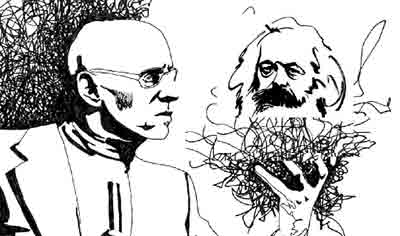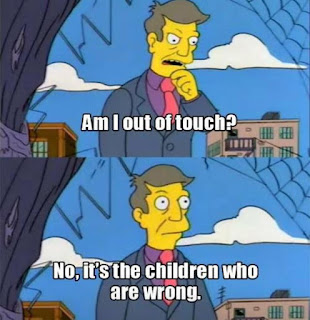Saturday, May 31, 2025
Do Your Own Damn Research: The New Episteme of Trump 2.0
Tuesday, July 23, 2024
Parallel Lines: Spinoza and Foucault (by way of Deleuze)
Sunday, February 04, 2024
Everybody Gets to be a Fascist: Or, What Taylor Swift Taught Me About Fascism
Years ago I remember encountering Félix Guattari's little essay, "Everybody Wants to be a Fascist." At the time its title seemed more clever than prescient. (Although it is worth remembering how much fascism, and the encounter with fascism was integral to Deleuze and Guattari's theorizing, well beyond the reference to Reich). Now that we are living in a different relation to fascism the problem posed by Guattari (and Deleuze) of desire seems all the more pertinent and pressing.
Friday, December 23, 2022
The Spontaneous Ideology of Conspiracy: This One on Marx
Sometime awhile ago I came up with the idea of doing a trilogy of posts on conspiracy theory, or modern conspiracy thought, read through Spinoza, Hegel, and Marx. I am not exactly sure why the idea appealed to me, in part because I increasingly consider Spinoza, Hegel, and Marx to be the cornerstones of my philosophical thought, even if these cornerstones come through the mediations of Tosel, Jameson, and Althusser (to name a few), but in this case, more specifically it seemed worth asking what would three critics of the mystifications of their day make of our modern mystifications.
Sunday, May 01, 2022
Elites and Capital: or, Foucault and Marx Again
Saturday, January 15, 2022
Despair and Indignation: The Inevitable Reflection on Covid (with Marx and Spinoza)
Wednesday, August 25, 2021
Fighting for Subjection as if it was Rebellion: Spinoza and Servitude Today
As I have already indicated on this blog more than once, Spinoza's formulation of subjection remains in some sense a guiding question for me.
"...the supreme mystery of despotism, its prop and stay, is to keep men in a state of deception, and with the specious title of religion to cloak the fear with which they must be held in check, so that they will fight for their servitude as if for salvation, and count it no shame but the highest honour, to spend their blood and lives for the glorification of one man…" --Spinoza, Tractatus Theologico-Politicus 1670
So much so that I would be willing to agree with Gilles Deleuze and Félix Guattari when they repeated it three hundred years later.
"That is why the fundamental problem of political philosophy is still precisely the one that Spinoza saw so clearly, and that Wilhelm Reich rediscovered: “Why do men fight for their servitude as stubbornly as though it were their salvation?” --Gilles Deleuze and Félix Guattari, Anti-Oedipus: Capitalism and Schizophrenia 1972
However, I have begun to think that it is time to update the question, or at least change its formulation, it increasingly seems to me that in the current era it is not so much servitude that is fought for as salvation, but subjection that is fought for as rebellion, or misrecognized as rebellion.
Monday, May 18, 2020
Writing Rifts: On Balibar's Écrits I and II
Monday, November 05, 2018
We Once Were Ungovernable: On Chamayou's La Société Ingouvernable
Thursday, July 28, 2016
A Point of Heresy: Balibar on Foucault
Monday, March 14, 2016
Hobbes Versus Spinoza: This Time It's Anthropological
Thursday, June 11, 2015
Naturally Historical: On Paolo Virno's When the Word Becomes Flesh and Déjà Vu and the End of History
Thursday, January 22, 2015
Class Structure: On Bidet's Foucault Avec Marx
Friday, December 12, 2014
The Ideology of Norms: On Macherey's Le Sujet des Normes
Friday, September 26, 2014
Intellectual Firmament: From Censorship to Attention
Wednesday, September 11, 2013
Brutality Today: Brief Remark on Chamayou's Manhunts
Monday, October 08, 2012
Our Nature is to Change Our Nature: Bertrand Ogilvie and Political Anthropology
Sunday, September 16, 2012
"Be More Productive": Marx, Foucault, Macherey
The good folks at Viewpoint have published a (new) translation of Michel Foucault's "Les Mailles du Pouvoir." This was originally a lecture that Foucault gave in Salvador, Brazil. It was published in Dits et Écrits, but was not included in the truncated Essential Works of Michel Foucault, a collection which is less an abridged version of the comprehensive French collection than it is a repackaging of Foucault's already published works. Unfortunately, "Essential" is less a descriptive term than it is a performative one, and this collection will probably be the official word on Foucault's writing. Which is too bad, the "Mesh of Power" (to use the name of the translation) is one of those texts that, to borrow a phrase from Foucault, would have saved many of us a lot of time. By "us" I mean those that were interested in the relation between Marx and Foucault.


















